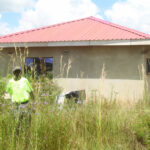A viral video depicting Zimbabweans engaging in a toyi-toyi protest against plans to extend President Emmerson Mnangagwa’s term has ignited a fierce response from the ruling Zanu-PF party. The party’s call for the arrest of the protesters underscores the growing unease within its ranks as resistance to the proposed extension mounts.
The flash protest, captured on video and widely circulated on social media, took place in Bulawayo. The footage depicts ordinary citizens engaging in the traditional toyi-toyi protest, a powerful symbol of dissent in Zimbabwean politics. This display of public opposition has clearly rattled Zanu-PF, prompting a swift and aggressive response.
Zanu-PF’s Bulawayo province, in a post on X (formerly Twitter), openly accused opposition leaders and civil society groups of orchestrating the protest, alleging that they are recruiting youths to oppose the proposed amendment.
The party’s statement reads: “These gatherings are seemingly a response to the Zanu PF resolution to extend President Mnangagwa’s term beyond 2028, but their true intention is to stir emotions against the government and the President.”
The party further warned against the protests, citing the economic damage caused by previous unsanctioned protests in Bulawayo in 2019. The statement ominously concludes: “The owners of the houses where the secret gatherings are being held are being warned to desist from allowing such activities to take place at their premises. The authorities are cautioning that the law will catch up with them if they continue to facilitate these gatherings, which are aimed at inciting riots against the government.”
Reports indicate that the police are currently reviewing the video footage of the protest, although National police spokesperson Commissioner Paul Nyathi was unavailable for comment.
Zanu-PF spokesperson Farai Marapira, while acknowledging the right to protest, insisted that any such actions must remain within the bounds of the law.
“Democracy entails people respecting other people’s opinion,” Marapira stated. “Those who want the President to continue are expressing their views and they should not be stifled. We encourage those who want to protest to do it under the ambit of the law.”
Information minister Jenfan Muswere, in a separate statement, downplayed the controversy, asserting that there is nothing inherently criminal in discussing the 2030 agenda. However, he also criticised the Zimbabwe Heads of Christian Denominations (ZHCD) for urging Mnangagwa to resist calls for a term extension, accusing them of pursuing a regime change agenda. This accusation further highlights the growing tensions surrounding the proposed constitutional amendments.
Opposition parties have strongly condemned Zanu-PF’s response to the protest. MDC leader Douglas Mwonzora expressed concern over the government’s apparent attempt to suppress dissenting voices.
MDC presidential spokesperson Lloyd Damba echoed this sentiment, stating: “The church, which is a mirror of society and especially those who are Christians, merely expressed a genuine and legitimate concern. It is a fact that the proposed amendments are self-serving and very selfish, which may lead to civil strife in the country. By openly bullying the church, the government is making a clear indication that dissent is a no-go area and will not be tolerated by those in power today.” Damba also argued that the ED2030 agenda runs counter to popular sentiment.
The Crisis in Zimbabwe Coalition, a prominent civil society organisation, convened a meeting to strategise resistance to the proposed constitutional amendments, highlighting the widespread opposition to the plan.















